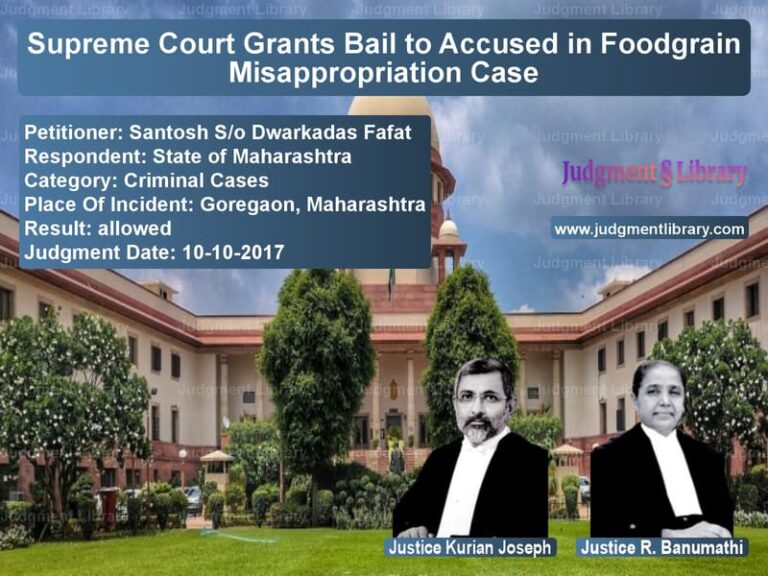Supreme Court Upholds Settlement Scheme for Agricultural Research Employees
The case of Central Agricultural Research Institute & Anr. vs. Presiding Officer, Labour Court & Ors. is a landmark judgment concerning employment disputes and labor law under the Industrial Disputes Act, 1947. The Supreme Court ruled in favor of a one-time settlement scheme framed by the appellants, allowing affected employees to claim benefits under the scheme while preserving their right to pursue unresolved grievances.
Background of the Case
The dispute involved employees of the Central Agricultural Research Institute who had challenged their employment conditions before the Labour Court. The Labour Court had ruled in favor of the employees, and the decision was upheld by the High Court. Dissatisfied with this ruling, the appellants approached the Supreme Court, questioning whether the institute qualified as an ‘industry’ under the Industrial Disputes Act, 1947.
During the proceedings, the Supreme Court suggested that the appellants consider a one-time settlement scheme to resolve the dispute amicably. The appellants subsequently framed a scheme, which was presented to the Court. However, the respondents (workers) opposed the scheme, arguing that it did not fully address their concerns.
Legal Issues Raised
- Whether the Central Agricultural Research Institute qualifies as an ‘industry’ under the Industrial Disputes Act, 1947.
- Whether a one-time settlement scheme could substitute the Labour Court’s award.
- Whether the affected employees retained the right to challenge unresolved grievances despite accepting the scheme.
Arguments by the Parties
Arguments by the Appellants (Central Agricultural Research Institute & Anr.)
- The institute may not qualify as an ‘industry’ under the Industrial Disputes Act, 1947, and therefore, the Labour Court’s ruling might not be applicable.
- The appellants had paid wages under Section 17B of the Act for a considerable time, showing compliance with legal requirements.
- A settlement scheme was framed to compensate employees and resolve the dispute amicably.
- The scheme provided a fair resolution and should replace the Labour Court’s award.
Arguments by the Respondents (Workers)
- The scheme proposed by the appellants was not acceptable as it did not fully address their claims.
- The Labour Court’s ruling should be upheld, and workers should be entitled to the benefits awarded by the Court.
- The workers should have the right to raise additional grievances even if they accept benefits under the scheme.
Supreme Court’s Observations
The Supreme Court examined the arguments and made the following key observations:
- The one-time settlement scheme framed by the appellants provided a reasonable resolution of the dispute.
- In the interest of fairness, the scheme should be implemented while allowing affected workers to raise any remaining grievances.
- The Court did not decide whether the Central Agricultural Research Institute qualifies as an ‘industry’ under the Industrial Disputes Act, leaving the question open for future interpretation.
- The settlement was ordered to be implemented before October 29, 2016, in light of the Diwali festival.
Final Judgment
The Supreme Court ruled as follows:
- The appeals were disposed of by directing the appellants to implement the one-time settlement scheme.
- The scheme was to be implemented before October 29, 2016, ensuring timely disbursement of benefits to affected workers.
- The ruling allowed workers to raise any remaining grievances through appropriate legal channels.
- The case was disposed of without any costs imposed on either party.
Analysis of the Judgment
Recognition of Settlement Mechanisms
The Supreme Court’s decision underscores the importance of settlements in labor disputes. By approving the one-time settlement scheme, the Court promoted alternative dispute resolution mechanisms that ensure swift justice.
Protecting Workers’ Rights
Although the Court upheld the settlement scheme, it also ensured that workers retained the right to raise additional grievances. This balanced approach protected both the employer’s and employees’ interests.
Unresolved Legal Questions
The ruling left open the question of whether the Central Agricultural Research Institute qualifies as an ‘industry’ under the Industrial Disputes Act, which could be relevant in future cases involving similar institutions.
Implications of the Judgment
For Employers
- Employers may consider settlement schemes as an effective alternative to prolonged litigation.
- The ruling highlights the importance of fair and timely settlements to avoid legal complexities.
For Workers
- Workers can benefit from judicially approved settlement schemes while retaining the right to pursue further claims.
- The ruling reinforces the protection of workers’ legal rights even in settlement cases.
For Labor Laws and Policy
- The judgment demonstrates how courts can facilitate fair settlements in labor disputes.
- It provides a model for balancing employer and employee rights through negotiated resolutions.
Conclusion
The Supreme Court’s ruling in Central Agricultural Research Institute & Anr. vs. Presiding Officer, Labour Court & Ors. affirms the use of settlement schemes in labor disputes. By directing the appellants to implement the scheme before October 29, 2016, the Court ensured timely relief for workers while allowing them to seek further remedies. This judgment serves as an important precedent for labor dispute resolution in India.
Don’t miss out on the full details! Download the complete judgment in PDF format below and gain valuable insights instantly!
Download Judgment: Central Agricultural vs Presiding Officer, L Supreme Court of India Judgment Dated 24-10-2016.pdf
Direct Downlaod Judgment: Direct downlaod this Judgment
See all petitions in Employment Disputes
See all petitions in Disciplinary Proceedings
See all petitions in Pension and Gratuity
See all petitions in Judgment by Kurian Joseph
See all petitions in Judgment by Rohinton Fali Nariman
See all petitions in settled
See all petitions in settled
See all petitions in supreme court of India judgments October 2016
See all petitions in 2016 judgments
See all posts in Service Matters Category
See all allowed petitions in Service Matters Category
See all Dismissed petitions in Service Matters Category
See all partially allowed petitions in Service Matters Category







